When talking to kids about divorce, choose a time with few distractions and emotions. Avoid holidays and plan when things are calm. Both parents being there is essential for support. Keep the conversation simple to prevent overwhelm. Mediators can help parents communicate constructively, prioritizing the children. Planning together and having a unified message reassures kids. Explain the divorce without blame, focusing on love remaining. Address post-divorce changes clearly, emphasizing it's not their fault. Support children with patience, stability, and understanding. Reassure them constantly that love remains. Being open with kids and breaking the news together as parents fosters understanding and trust.
Key Takeaways
- Choose a calm time for the conversation.
- Craft a non-blaming narrative.
- Explain changes post-divorce clearly.
- Offer reassurance and support consistently.
- Maintain open communication and encourage expression of feelings.
Timing the Conversation
When preparing to talk to kids about divorce, it's important to carefully consider the timing of the conversation to guarantee minimal distractions and emotional stress. Choosing a time when there are no upcoming events or distractions is pivotal. It's advised to avoid discussing divorce during holidays, birthdays, or other emotionally charged occasions to minimize additional stress on the children. Considering the child's schedule and emotional state when planning the conversation is essential for them to effectively process the information. Timing the conversation during a calm and quiet period can help children absorb the news without feeling overwhelmed.
Furthermore, selecting a time when both parents can be present is advantageous. This allows for unified support and ensures that immediate questions the children may have can be answered promptly. By being mindful of the timing and environment when discussing divorce with kids, parents can help facilitate a smoother and more understanding conversation for their children.
Using a Mediator
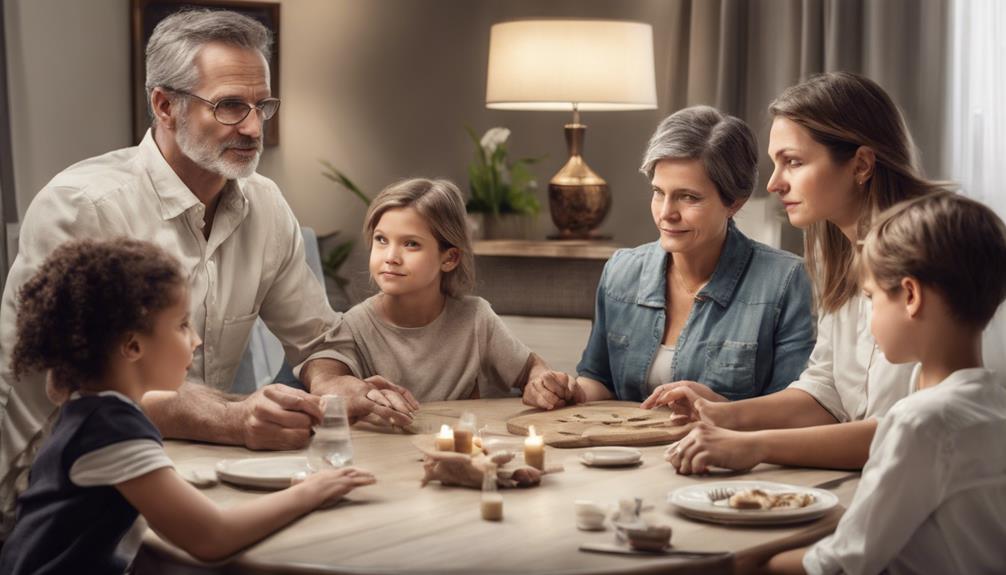
Considering the complexity of divorce proceedings, involving a mediator can provide invaluable assistance in facilitating constructive communication between divorcing parents. Mediators, as neutral third parties, help resolve disputes and reach agreements in a calm, structured manner. They prioritize the needs of the children, guiding parents to make decisions for the benefit of the entire family.
By using a mediator, conflict can be reduced, leading to an improved co-parenting relationship post-divorce. This approach isn't only effective but also cost-efficient, offering an efficient way to address parenting issues and formulate a thorough parenting plan. Mediation guarantees that discussions remain focused on the well-being of the children while promoting collaboration between parents.
This process can help divorcing individuals navigate challenging conversations with greater ease and understanding, ultimately fostering a healthier environment for the entire family during and after the divorce.
Talking Together as Parents

In order to establish a unified approach in discussing the news of divorce with their children, parents should plan and communicate together, emphasizing consistency and support. Here are three key points to contemplate when talking together as parents:
- Avoid Conflicts: Planning the conversation as a team can help prevent misunderstandings and conflicts between parents, ensuring a cohesive message is delivered to the children.
- Consistent Message: Agreeing on what to say beforehand allows parents to present a united front and provide a consistent narrative, which can help children better understand the situation.
- Reassurance and Stability: Showing unity in co-parenting discussions reassures children and provides them with a sense of stability during the challenging process of divorce.
Creating a Non-Blaming Narrative

Crafting a narrative that avoids blame is vital when explaining divorce to children, focusing on providing a general understanding of the situation. It's essential to share why the divorce is happening without pointing fingers at the other parent. By doing so, children can grasp the concept without feeling the need to pick sides.
Reassurance plays a significant role in this process; children should be assured that their parents' love for them remains unchanged despite the divorce. Additionally, informing kids about the upcoming changes in their living arrangements post-divorce is necessary, but it should be done without placing blame on anyone. This non-blaming narrative helps children understand the divorce without feeling caught in loyalty binds.
Addressing Changes Post-Divorce
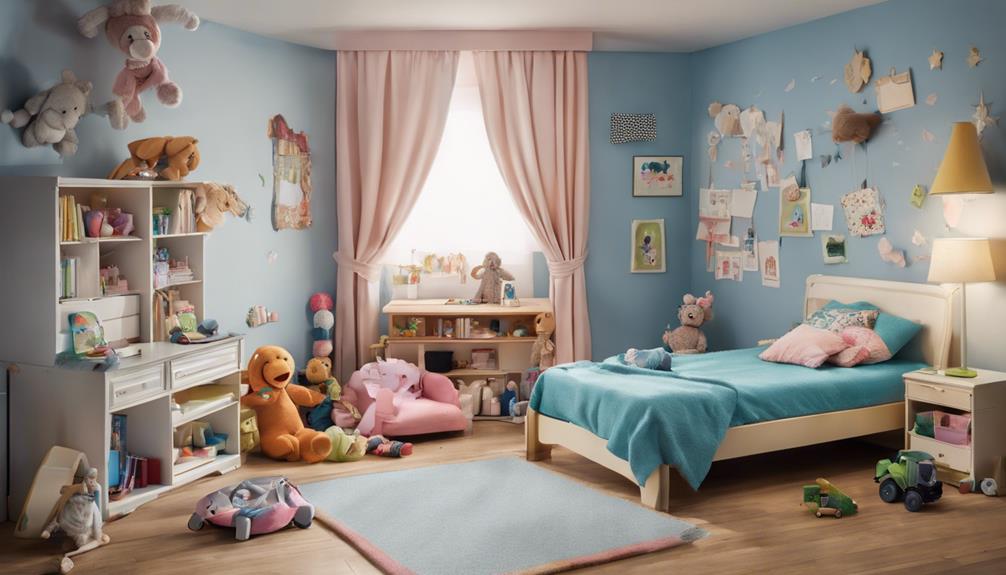
It's important to talk to children about the changes that will happen after a divorce, such as new living arrangements and adjusting to a different routine. This conversation should emphasize open lines of communication, encouraging kids to ask questions and express their feelings.
New Living Arrangements
After a divorce, parents should clearly explain to their children the new living arrangements to provide clarity and reduce uncertainty. It's essential to inform children about where they'll live post-divorce, helping them understand the logistics of moving between two homes to facilitate the process of change.
Parents should also reassure kids that the changes in living arrangements aren't their fault, alleviating feelings of guilt. Providing a consistent and stable environment in both homes is vital to promote a sense of security for children.
Encouraging open communication about feelings and concerns related to the new living arrangements can support emotional well-being during this challenging time.
Adjusting to Changes
When discussing the modifications post-divorce, parents should address the changes in routines and living situations with empathy and reassurance for their children.
Informing children about new living arrangements post-divorce provides clarity and stability. It's vital to reassure kids that the divorce isn't their fault, emphasizing parental responsibility for the changes.
Acknowledge and accept children's emotional reactions with empathy and support. Encourage open communication by inviting questions from children and respecting their pace of adjustment.
Allow children time to process the news and changes, showing patience and understanding throughout the transformation. By handling these adjustments with empathy and reassurance, parents can help their children navigate the changes post-divorce effectively.
Open Communication Lines
To address changes post-divorce effectively, parents should establish and maintain open lines of communication with their children. This communication is vital for helping kids navigate the new living arrangements and understand that the divorce isn't their fault.
By keeping the channels of communication open, parents can reassure their children that both parents will continue to love and care for them, despite the changes happening around them. Encouraging children to express their feelings and concerns openly fosters emotional processing and helps them come to terms with the new normal.
It's important to offer support during this adjustment period and allow children the time they need to adapt to the news and changes, acknowledging that each child may react differently to the situation.
Offering Reassurance and Support
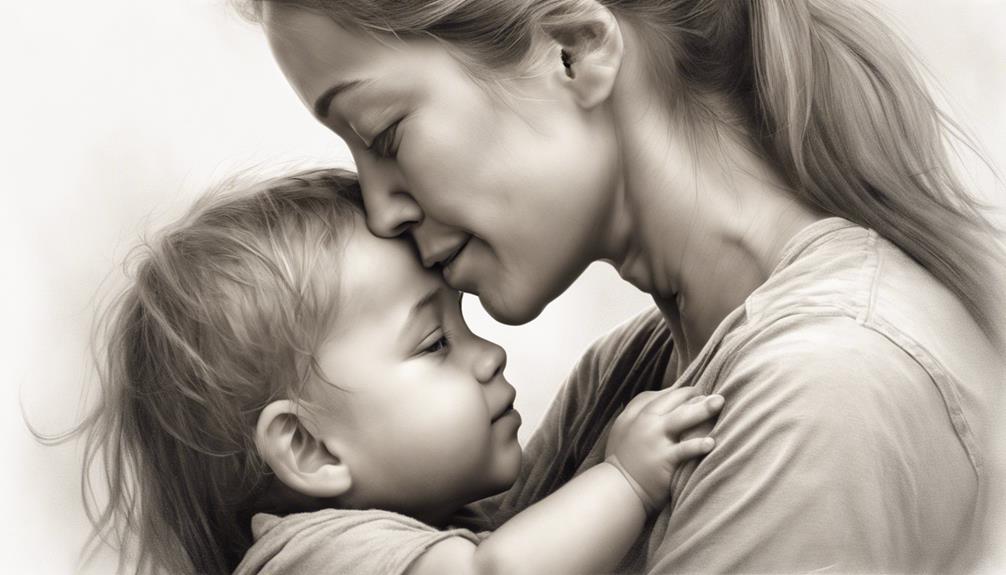
One effective way to help children cope with divorce is by offering reassurance and support throughout the process. It's vital to emphasize to children that the divorce isn't their fault, helping alleviate any feelings of guilt or responsibility they may be experiencing.
Providing emotional support means actively listening to their concerns and validating their feelings during this challenging time. Consistent love and care are essential post-divorce to maintain a sense of security and stability for children.
Encouraging open communication and honesty can help children process their emotions and understand the changes happening within their family unit. Additionally, modeling healthy coping mechanisms and self-care practices can show children how to navigate challenges and build resilience.
Allowing Children to Adjust
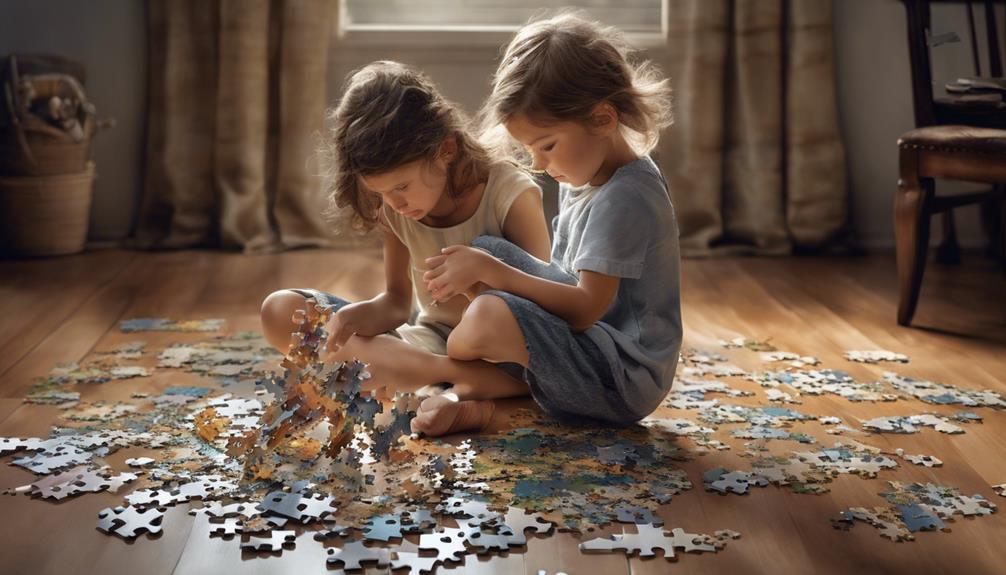
Allowing children the necessary time and space to adapt to the changes brought about by divorce is crucial, fostering an environment conducive to their adjustment process. It's important to support children during this period of change. Here are three key ways to help children adjust:
- Be Patient and Understanding: Children need time to process the news of divorce. Show patience and empathy as they navigate their emotions and thoughts.
- Reassure Them: Let children know that the divorce isn't their fault. Providing this reassurance can help alleviate feelings of guilt or responsibility.
- Encourage Communication: Create a safe space for children to express their feelings and concerns about the divorce. Open dialogue can aid in their adjustment and understanding of the situation.
Preparing in Advance
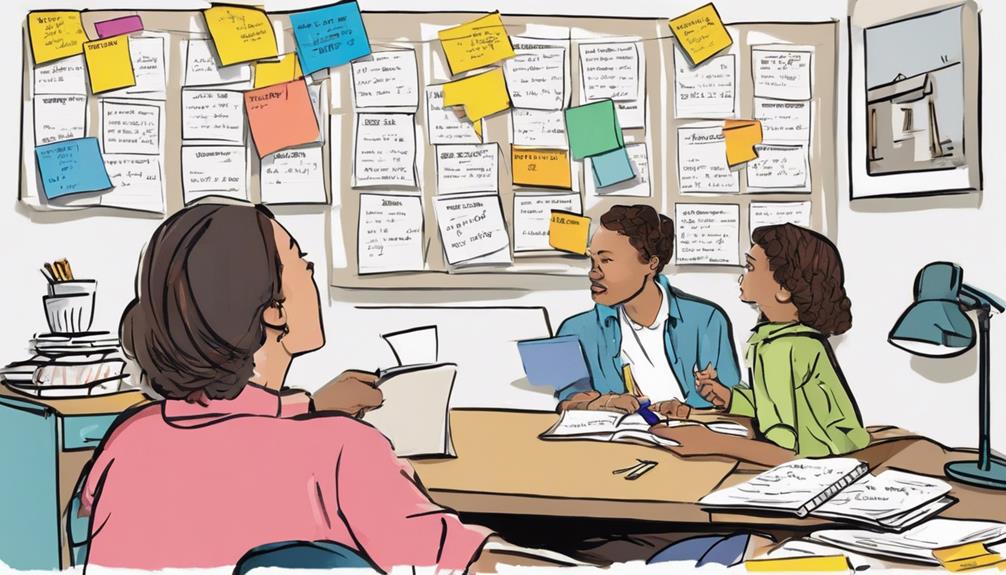
When getting ready to talk to kids about divorce, it's important to set aside dedicated time to have the conversation, select the appropriate words, and take into account the child's feelings. By preparing in advance, parents can guarantee they address their children's concerns openly and honestly, providing them with the support they need to navigate this challenging time.
Anticipating questions, considering the child's age and understanding, and reassuring them of continued love and care can help create a more stable environment for children facing divorce.
Set Time Aside
Allocating time in advance to prepare for discussing divorce with children is pivotal for guaranteeing a supportive and aligned approach from both parents. Here are three essential steps to contemplate:
- Clarify the Message: Take time to discuss and agree on the key points you want to convey to your children, such as reassurance of continued love and care.
- Anticipate Questions: Be ready to address your children's potential inquiries about the divorce, which can make the conversation smoother and more supportive.
- Consider Their Age: Tailor your approach based on your children's age to ensure the conversation is appropriate and understandable for them.
Taking these steps can help create a more empathetic and effective discussion about divorce with your children.
Choose Right Words
To ensure a supportive and effective discussion with children about divorce, parents should carefully choose their words in advance. It's vital for both parents to align their message before talking to the children.
Reassuring kids of continued love and care should be a top priority during the conversation. Anticipate and be prepared to address any questions the children may have about the divorce.
When planning the timing and approach, consider the age and maturity level of the children. For younger children (ages 2-5), introduce the concept of two homes positively to help them understand the upcoming changes.
Consider Childs Feelings
Considering the child's perspective is vital when preparing to talk to them about divorce. Focusing on their emotions and reassuring them of love and care is essential. Addressing their feelings like fear, sadness, and confusion during the conversation is crucial. Reassure children of your love and support before discussing the divorce to help them feel secure. Understanding their emotional reactions can guide your approach in preparing for the discussion. Creating a supportive and empathetic environment is paramount to help children cope with the news of divorce.
- Acknowledge and address children's emotions like fear, sadness, and confusion during divorce discussions.
- Reassure children of your love and care before discussing the divorce to help them feel secure.
- Understanding children's emotional reactions can guide your approach in preparing for the conversation.
Breaking the News Together

Breaking the news of divorce together as a couple demonstrates unity and shared responsibility as parents. It reassures kids that both parents are involved and care about their well-being, preventing them from feeling caught in the middle. This united approach can reduce children's anxiety and confusion, fostering stability and consistency. To illustrate the benefits of breaking the news together, consider the following table:
| Benefits of Breaking News Together | Details | Importance |
|---|---|---|
| Demonstrates Unity and Shared Responsibility | Shows both parents are involved and care | Reassures kids, reduces anxiety |
| Prevents Children Feeling Caught in the Middle | Kids see both parents working together | Avoids emotional burden on children |
| Reduces Anxiety and Confusion | Presents a united front to children | Creates a sense of security and understanding |
| Fosters Stability and Consistency | Shared communication about divorce | Helps kids adapt to changes more smoothly |
| Promotes Reassurance for Children | Kids feel supported and cared for | Strengthens parent-child relationships |
Frequently Asked Questions
At What Age Is a Child Most Affected by Divorce?
Children between 6 and 11 years old are often most affected by divorce emotionally. They may internalize blame. Understanding the developmental impact on different age groups is essential for providing appropriate support and explanations tailored to their needs.
How Do I Talk to My Child About Divorce?
When discussing divorce with a child, parents should prepare together, choose a suitable time, avoid blame or oversharing, reassure the child it's not their fault, and be honest in answering questions. Communication is key.
What Not to Tell Your Kids About Divorce?
Parents should avoid blaming each other, sharing intimate details, using kids as messengers, speaking negatively about the other parent, and discussing financial or legal matters with children when addressing divorce. Maintaining a healthy dialogue is essential.
How Do I Help My Child Cope With Divorce?
To help a child cope with divorce, reassure them it's not their fault, encourage open communication, maintain routines for stability, offer support as they adjust, and seek professional help if needed for emotional concerns.
Conclusion
To wrap up, discussing divorce with children can be challenging, but it's crucial to approach the discussion with care and sensitivity. Keep in mind the age-old adage, 'Honesty is the best policy.'
By timing the conversation appropriately, utilizing a mediator if necessary, and crafting a non-blaming narrative, parents can assist children in navigating this challenging period with reassurance and support.
By addressing adjustments post-divorce, allowing children to acclimate, and preparing in advance, families can collaborate to navigate this change successfully.










